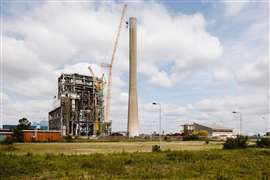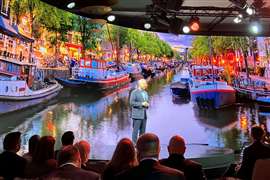Read this article in Français Deutsch Italiano Português Español
China’s Dingli dodged a bullet on anti-dumping duty – now its focus is innovation for growth
08 October 2025
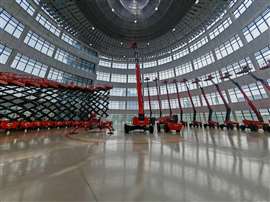 A range of Dingli machines at the access equipment manufacturer’s headquarters outside Hangzhou, Zhejiang, China
A range of Dingli machines at the access equipment manufacturer’s headquarters outside Hangzhou, Zhejiang, China
A few short years ago, it was boomtime for Chinese access equipment manufacturers.
But the boom has given way to more painful times, as manufacturers in the country face pressure on several fronts, from sluggish demand at home to trade barriers in Europe and the United States.
Nonetheless, when Construction Briefing visited Dingli’s state-of-the-art headquarters in outside Hangzhou, Zhejiang province this summer, founder and chairman Mr. Xu Shugen cut a confident figure.
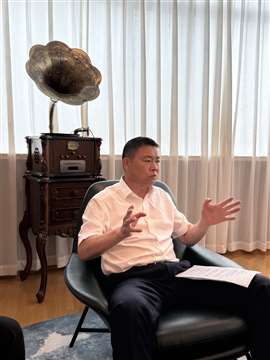 Mr. Xu Shugen, founder and chairman of Dingli
Mr. Xu Shugen, founder and chairman of Dingli
Open about the challenges, he remains convinced his company is well placed to weather the storm.
That confidence comes from a strategy that has consistently set Dingli, the 38th biggest construction equipment manufacturer in the world according to International Construction’s latest Yellow Table, apart from its competitors.
For one thing, Mr. Xu points out that the company has refused to join the price wars that have engulfed parts of the Chinese construction machinery sector.
Instead, Dingli has focused on premium products, manufactured to rigorous standards and backed by heavy investment in research and development.
It is an approach that has helped the company escape the harshest anti-dumping and anti-subsidy tariffs recently imposed on Chinese mobile elevating work platform (MEWP) manufacturers in Europe, leaving it with the lowest rates of any producer in the European Commission’s crosshairs.
“Other companies may cut their prices to grow sales,” Mr. Xu explains. “But Dingli does not break the rules of the industry. We maintain a reasonable prices, we innovate, and we focus on customer satisfaction. That is how we will continue to develop.”
Pioneering electrification and modular design
Dingli has built a reputation as a pioneer of product innovation in the MEWP sector. Over the past two decades the company has invested heavily in electrification, and today it claims to be the first manufacturer able to offer a fully electrified product line, from compact scissors to large rough-terrain machines.
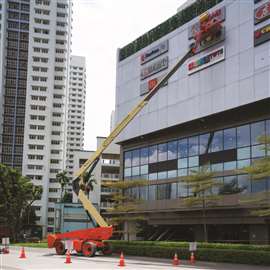 Galmon, one of Singapore’s largest rental companies, offers Dingli machines for hire.
Galmon, one of Singapore’s largest rental companies, offers Dingli machines for hire.
“Some manufacturers only electrified small models,” says Mr. Xu. “We can electrify the entire series, even big scissors and booms with large load capacities. We are the first to realise this in the world.”
Equally central to Dingli’s approach is modular design. By standardising components across product lines, Dingli has reduced maintenance complexity and cut storage requirements for spare parts. For fleet owners and rental companies, this means lower operating costs and faster servicing. For the company itself, it provides efficiencies in production and logistics, including the ability to make almost all products fit inside a standard shipping container.
“Once technicians know how to maintain one model, they can maintain the whole series,” Mr. Xu notes. “That is the advantage of modular design.”
It has also maintained a “closed loop” approach to manufacturing, which Mr. Xu says makes the company less vulnerable to supply chain shocks as well as generating cost savings on transportation.
Beyond construction
While construction remains a core market, Mr. Xu is quick to stress that MEWPs are not confined to building sites. “Excavators are only for digging,” he says. “But AWPs can be applied in many industries. Construction is just one of them.”
Dingli has also developed differentiated products for specialist applications, from glass-handling booms to automated drilling robots for tunnelling. Some of these address relatively small markets, but Mr. Xu sees them as important drivers of innovation and a way to meet specific customer needs. “Even if the volumes are modest, these machines show what our R&D can achieve,” he explains.
Tariffs: A plan B for the US
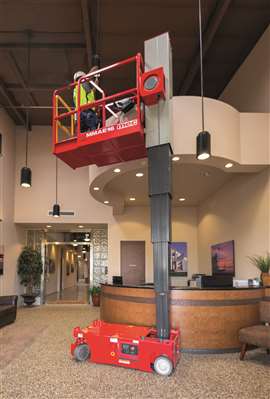 MEC’s all-electric MMAE 16 vertical mast, which can reach a height of 16ft, in the lobby of a commercial building (Image: MEC)
MEC’s all-electric MMAE 16 vertical mast, which can reach a height of 16ft, in the lobby of a commercial building (Image: MEC)
If trade tariffs are one of the biggest external challenges for Dingli, Mr. Xu insists they are also a measure of the company’s resilience.
The US remains a key market, and Dingli has continued to ship products there despite the imposition of Section 301 tariffs (on imports from China).
“There is very direct influence on our sales and profits,” Mr. Xu concedes, speaking before the US extended tariffs in August on steel and aluminium to goods derived from the metals. “But we can bear this pressure and continue normal deliveries. If the time comes that it is no longer possible, then we have a plan B.”
That plan rests on MEC, the US manufacturer in which has gradually built up a major stake, starting with 25% in 2017 before announcing a plan to acquire full ownership in late 2023. MEC provides Dingli with a foothold in American manufacturing, allowing it to mitigate tariff exposure if necessary.
“We can combine MEC’s production with Dingli’s intelligent manufacturing to realise local production in the US,” Mr. Xu says. “This gives us a big advantage.”
However, for now the company continues to manufacture from its base in Zhejiang and has no plans to change that.
A strong position in the face of European tariffs
In Europe, the picture is mixed. Dingli has faced the same anti-dumping and anti-subsidy investigations as its Chinese peers, but Mr. Xu is proud of how the company emerged.
“We got the best result, not only compared to Chinese manufacturers but also compared to other brands manufacturing in China,” he says. “That is because we don’t engage in price wars. We obey the industry rules and we provide products at reasonable prices.”
The European Commission’s final ruling left Dingli with a 14.2% anti-subsidy duty and a 6.4% anti-dumping duty, giving a combined burden of around 20.6%. By comparison, Sinoboom faces roughly 49.3%, Zoomlion 41.7%, and Terex (Changzhou) Machinery about 35%, while non-cooperating companies are subject to rates exceeding 50%. Even JLG’s Chinese plant, which received no subsidy duty, still pays 22.5% in anti-dumping duty.
Although the European market has been affected by geopolitical tensions and the war in Ukraine, Mr. Xu remains optimistic about the long term. He points to prospective infrastructure investment in Germany worth €500 billion and to the potential rebound in the region once conflicts ease. “Even in a difficult environment, Dingli is still seeing growth in sales volumes,” he notes. “When the EU economy recovers, we will be the biggest beneficiary, because we have the lowest tariff.”
Expanding globally, carefully
Outside Europe and North America, Dingli is pursuing opportunities in emerging markets such as the Middle East, Brazil and India. But Mr. Xu stresses that the company is selective in its approach.
“We are not doing sales recklessly,” he says. “We choose the markets where we can provide after-sales service and build customer trust step by step. Some companies push products into markets without regard for customers’ demand. We would call that doing things the rude way and it’s not Dingli’s style.”
In countries that are increasingly protective of domestic industries (India, for example, reportedly only issued 2,000 employment visas to Chinese nationals in 2024), Dingli is adapting its approach. “Where we face barriers, we will set up local offices and hire local staff,” Mr. Xu explains. “That way we can cooperate between headquarters and local teams, and serve customers effectively.”
Consolidation and culture
China’s own market has slowed, particularly in construction and real estate, which has weighed on rental companies. Mr. Xu acknowledges the challenge but sees opportunities for MEWPs to diversify into other applications. “The requirement for construction is not as high as before,” he says. “But AWPs are not like excavators: They can be used in many scenarios. That is why we still have opportunities.”
Dingli is targeting small and medium-sized rental companies to build a more stable customer base.
On the question of Chinese manufacturers acquiring overseas brands, Mr. Xu is sceptical. “It is not easy to manage a European company,” he says. “The working styles are different. Europeans value the steady way, while Chinese companies prioritise speed and efficiency. That does not make for smooth cooperation.”
He is more open to the idea of acquisitions in developing regions, where cultural differences are less pronounced, but overall he sees limited prospects for consolidation.
However, Dingli does draw on its overseas R&D centres in Germany and the US to strengthen its design capabilities.
A vision for growth
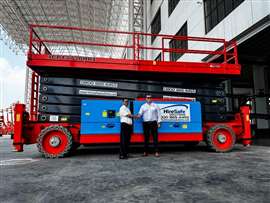 Hire Safe Solutions and Dingli co-created the Dingli 3730HRT, the world’s tallest scissor lift.
Hire Safe Solutions and Dingli co-created the Dingli 3730HRT, the world’s tallest scissor lift.
For Mr. Xu, Dingli’s path forward is clear: premium products, manufactured under one roof in Zhejiang, supported by a disciplined approach to pricing and a relentless focus on R&D.
In a global market where some rivals compete on cost alone, Dingli aims to compete on quality, durability and customer trust.
“Even in a difficult market, we remain optimistic,” Mr. Xu says. “Because we have chosen the right path: innovation, sustainability, and respect for the rules of the industry. That is how Dingli will grow.”
STAY CONNECTED


Receive the information you need when you need it through our world-leading magazines, newsletters and daily briefings.
CONNECT WITH THE TEAM









